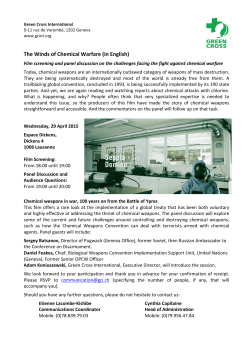
- Opus: Online Publications Store
Edwards, B. (2015) The "false allure" of biological weapons deterrence. Bulletin of the Atomic Scientists, Roundtable: The wint. ISSN 0096-3402 Link to official URL (if available): http://thebulletin.org/winter-safedeterrence-debate/false-allure-biological-weapons-deterrence Opus: University of Bath Online Publication Store http://opus.bath.ac.uk/ This version is made available in accordance with publisher policies. Please cite only the published version using the reference above. See http://opus.bath.ac.uk/ for usage policies. Please scroll down to view the document. 03/19/2015 - 14:45 The "false allure" of biological weapons deterrence Published in The Bulletin of the Atomic Scientists Roundtable on the Winter Safe Deterrence Debate. http://thebulletin.org/winter-safedeterrence-debate/false-allure-biologicalweapons-deterrence In reading the initial Twitter response of academics and nongovernmental organizations to Seth Baum’s recent article in Contemporary Security Policy, "Winter-safe deterrence: The risk of nuclear winter and its challenge to deterrence," one would have been forgiven for assuming that the paper was advocating the use of non-contagious biological weapons as an alternative to nuclear deterrence in a way that was entirely uncritical. However, this is simply not the case. While the article does not provide in-depth analysis of the broader implications of Baum's argument, several of the themes outlined in recent critiques are at least partially reflected in his analysis. This includes for example the idea that the "Biological and Chemical Weapons Conventions must be considered among the greatest successes of the international community," and the caveat that "[m]any people would probably rather not even consider rescinding these conventions to re-proliferate these weapons, as well as the potential proliferation risks of such weapons." The paper is then, a provocative thought experiment that considers a hypothetical approach to reducing the size of nuclear arsenals, rather than a polemic against biological weapon prohibition. It involves describing a situation of such devastating human consequence that even the most morally repugnant of acts might become justifiable. While it is tempting to engage in a more technical critique of assertions that are made about biological weapons in this article, I will leave this to colleagues with greater relevant expertise in this area. Instead, I want to draw attention to the almost allergic response of some commentators to Baum’s article, and consider its meaning and potential implications. The first key question one must ask is why such criticism has been forthcoming. A key reason: The paper is incredibly alien to those currently working in biological weapon control. This is because the paper is not motivated by the goal of ensuring the continued prohibition of biological weapons. Instead, the article provides a potential justification for developing and using such weapons. The article also places little emphasis on the benefits of the comprehensiveness of the international prohibition laid out within the 1972 Biological Weapons Convention. This convention prohibits the development, production, retention, stockpiling and use of such weapons under any circumstances. Any argument for "roll-back" within this treaty could also have implications for those working on sister treaty systems associated with the Conference on Disarmament. The unusual nature of the argument should not automatically invalidate the findings of the paper, but it does mean that the author would have to work hard to support such tentative assertions for them to be generally convincing. Such work would also likely have to go well beyond the scope of a single paper. If the author were to take up such a challenge, however, it would be entirely antithetical to the majority of academic and nongovernmental projects I am familiar with. From my perspective, the only potential value of such a project would be that it continued to cause other experts to recount the arguments against biological weapons and to explain why bioweapons cannot effectively replace nuclear weapons for strategic deterrence purposes. I don't think Baum’s original motivation was to encourage a discussion about the allure of biological deterrents. Instead, his treatment of biological weapon norm was just collateral damage in his attempt to address the issue of winter-safe deterrence. As stated above, while this is perhaps a questionable approach academically, it does not mean that the paper should not have been published in a peer reviewed academic paper such as Contemporary Security Policy. However, I do draw the line in at the appearance of these arguments, in a largely unqualified form, in a feature piece for The Bulletin. This publication has a respected, publicfacing, and humanitarian profile and addresses biological weapons as a core issue area. The organization has a responsibility to its readership to ensure that controversial arguments such as Baum’s are sign posted as such, at the point of publication. It seems likely that this is somewhat of a one-off paper. However, if it becomes the norm that biological weapon concerns are viewed predominantly and uncritically through a nuclear security lens within this publication, then this will likely have implications in terms of who contributes as well as the readership in the future. It would behoove The Bulletin to review its policy in relation to future publications of this type, to ensure concerns are flagged before the article goes to press. This will allow for decisions to be taken on the best way to present the article, if it is to be published. Controversial thought exercises, which go against the prevailing wisdom in relevant arms control communities, should be labelled just that. This is not to discredit such work, but to provide non-experts with a sense of the articles’ broader context. The second key question is the extent to which further discussion of Baum’s paper is of broader value. I do not believe Baum’s academic paper presents a convincing enough thesis to be a genuine challenge to the international status quo, nor do I expect to see his arguments made publicly elsewhere by other experts. However, the paper has motivated some scholars and nongovernmental organisations to reflect on the norm against biological weapons. This is important because the question of "why" biological weapons should be prohibited has often taken a back seat to the question of "how" biological weapons are prohibited. This is understandable, considering the recent history of biological weapons. For over a decade, concerns about sub-state and pariah-state terrorism have contributed to the further stigmatization of biological weapons in press and media coverage. However, as we have seen in Baum's article, the very same things which make such weapons abominable, may also contribute to their appeal. To sum up, I think the following key issues are worth further discussion. First, in the absence of any prospect of scientifically sound risk-benefit analysis, what sense does it make to advocate pursuing alternative modes of deterrence? Second, does Baum’s line of reasoning appeal to those working in the field of nuclear security? And finally, how can we ensure that the "false allure" of biological weapon deterrence does not take hold in the minds of the public and military strategists?
© Copyright 2025









